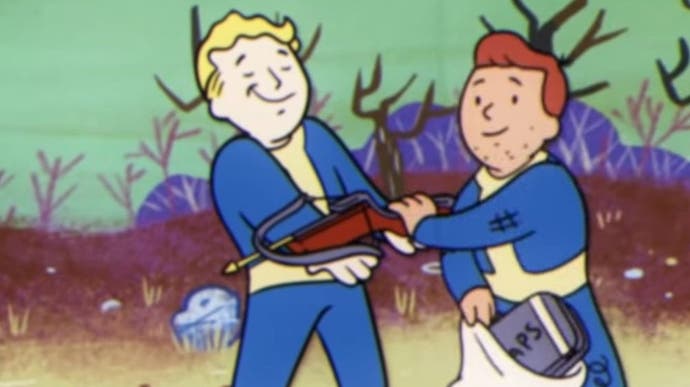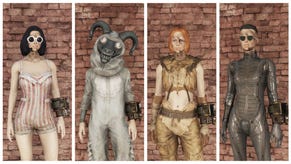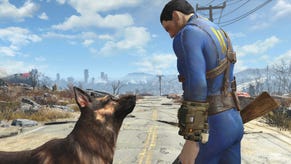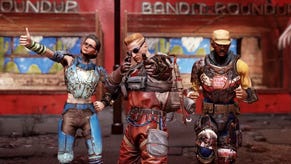In the virtual world of Fallout 76, Gun Runners are making thousands in real-world cash
Capsitalism.
For some reason I'm rapidly accruing a collection of dumb stories about my time in multiplayer games - and seeing as the Rust murder tale went down so well, I thought I'd recount another. This time it's about my brief foray into the world of Fallout 76 virtual gunrunning, which has since escalated into a detailed look at the life of the traders making serious bank from selling Fallout 76 items. I don't know how I ended up here.
Back in January, when the first wave of Fallout 76 backlash was at its peak, vast swathes of the Fallout subreddits were busy complaining about in-game glitches - and in particular, a cheating method called duping. It's a process by which players exploit a bug to duplicate items, with potentially game-breaking consequences if uncontrolled numbers of top-tier items suddenly flood a community and upset the balance. It's a phenomenon witnessed in other online games, but for Fallout 76 it was perceived as a serious problem by the community - with Bethesda constantly playing whac-a-mole trying to patch out new glitch methods as they appeared.
Over on eBay, some enterprising hustlers capitalised on the mess by creating their own cottage industry. Using the various duplication methods, the eBay accounts started selling dozens of Fallout 76's most valuable items. Fallout 76, of course, doesn't sell guns in its Atomic Shop on account of Bethesda's pledge to avoid pay-to-win microtransactions (although some argue it's already broken this pledge) - which means there's a market for gameplay-affecting items such as weapons and armour (and the raw in-game money and materials to acquire these). Then the secret dev room was discovered and unreleased items started appearing - a problem that hasn't quite gone away, judging by some recent listings.
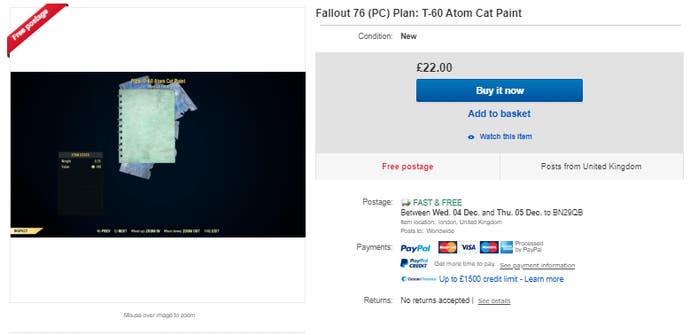
At the time, I'd already started investigating the item duping, as I was intrigued by how this worked. Who were these people? How did the gun delivery process work? And how had they avoided being caught? I then got a little sidetracked by the sight of those unreleased items and Wooby, so I never got around to talking about Fallout 76's real-money trading market.
Except, I'd already purchased one of the guns.

It didn't take long to find. A simple eBay search threw up a bunch of options for every platform - and faced with an abundance of choice, I searched for one that looked as overpowered as possible. "Two Shot Explosive Light Machine Gun (2star) (for Fallout 76, PC)" sounded like it would work. It set me back £7.75. The next step in this process was to contact the seller with my Discord name. I can happily report the anime-avatar eBay seller had excellent service: within hours, a Discord friend request popped up and they introduced themselves.
"hello :)
"im currently delivering an item to another customer, you're the next in line so will be available right after im done with him :)
"sorry for the delay."
Not only incredibly polite, the seller also seemed to have a full delivery schedule. It was a level of professionalism I wasn't prepared for, and I hurried back from my lunch break to arrange an in-game meet-up.
After a small struggle to add each other as friends, I was instructed to join the game world and fast travel to the seller's location. They'd chosen to set up shop at Charleston Station - a sensible choice, given it's typically one of the earliest locations players find in the game. The stations are always fairly enemy-free, and heavily populated by players seeking to access the vendor, stash box and workbenches there.
This didn't stop the transaction from feeling a bit shady.

As I approached the station, I could see the seller gesturing at me to come over. Entering cautiously, in the gloom I could see them squatting in a dingy corner, gesturing towards a rickety old end table, in which I found my gun. As the glorious weapon whirled around my monitor, the seller gave me a thumbs-up, and momentarily forgetting where the emote button was, I performed the universal gaming symbol to express gratitude: jumping. And there it was, my very own illicit gun.
If you want to see all of this play out in real time, you can, because I recorded it. (Apologies for the keyboard clacking away in the background - I left my mic on.)
Feeling a little dirty after the transaction, this is where I left this story for several months - until recently, when I revisited Fallout 76 to check out the new Fallout 1st subscription. Then, I started wondering to myself: who are these people selling virtual guns on eBay? Is it actually a viable side-hustle?
So I went back to my messages and found my gunrunner. Having confirmed this previously, I knew my seller had used duping as a method to make a vast quantity of weapons, but I wanted to find out more - and they were happy to oblige.
"I just started selling them out of the blue due to frustration with the game not listening to players," they told me over Discord, explaining it was a matter of making it "easier for others" while also making money for other games on the side. It was their first time selling virtual items, as in other games they played, the market was already oversaturated with "Chinese gold seller sites" (for games like World of Warcraft).
As the seller was mostly unemployed during this period, they had time to hop between deliveries - taking random customers from eBay and "making some notes on delivery times... in order to make buyers aware of some possible delays".
But then for the million-dollar question: how much had they made from Fallout 76 gunrunning?
"I've made around $2k (£1.5k), have been able to customise my gaming PC and can now enjoy high end better current and future games thanks to Fallout 76," the seller said. "So for at least that reason I'm happy with the game.
"There are people who made over $10k (£7.7k) or even more, due to them setting up personal sites listing those items, [with] an even broader customer base and no limitations or special costs imposed by eBay (some packs they were selling were even $100 or $300+)."
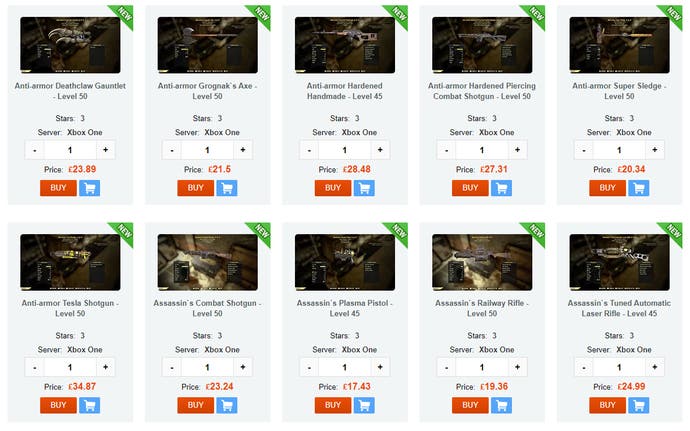
While it didn't sound like a sustainable long-term earner, I was still surprised by the numbers. Yet it was a gravy train that eventually ended for the seller, thanks to measures taken by both Zenimax and Bethesda.
"The first ones who did something were Zenimax [Bethesda's parent company] by sending a global notice to eBay to force people selling in-game items related to F76 to stop selling them and end the listings, or they would incur in suspension of the eBay account, at which point I retired from this practice," the seller claimed. "After I stopped, some weeks later the mass ban happened and I was included in it."
The seller later clarified they got caught up in the February banwave, which cleared out a significant portion of the dupers. Judging by those dates, the seller must have made the $2k in less than four months.
With a steer from my eBay seller, I spent some time trying to get in contact with traders on the sites where weapons bundles are still being sold for up to £1500, such as G2G, along with privately-owned sites U4N and U4GM where items and weapons are bought directly from suppliers to be re-sold. Generally speaking, the sites sell items and in-game currency for a wide variety of online games (such as WOW, Rocket League and even Pokémon Sword and Shield), and often charge more than sellers on eBay - although the "face-to-face" delivery methods are the same. eBay takes a 10 per cent cut for each item sold - and while G2G starts at 9.99 per cent, it lowers to 4.99 for experienced traders. U4GM takes a more direct approach by purchasing bulk items from players, and then selling them on the platform. On a smaller scale, some traders post adverts on forums and arrange trades over Discord, with payments made via PayPal or cryptocurrencies such as Skrill - thereby bypassing service fees entirely.
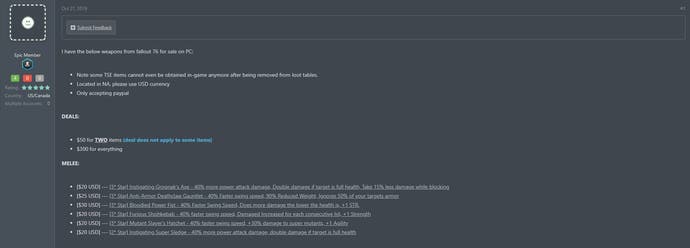
After several attempts, I did manage to talk to one of the traders on the website G2G, who had an extensive trading record with over 250 items sold on that site alone. They're currently listing one of the super expensive packs my eBay seller had talked about - a triple-item pack for £779.32 (although my eBay gunrunner claimed this is far less egregious than some of the listings from earlier this year, before the banwaves).
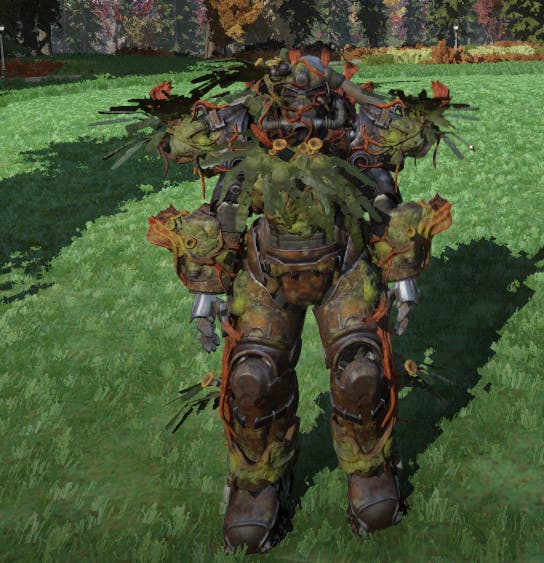
It does seem that some of these extremely high-price packs are more for show (or perhaps out of hope) than a realistic listing. The G2G seller's biggest deal to date, they told me, was actually a $250 (£189.96) strangler heart power armour set - which has now been reduced to $60 (£46.53) thanks to increased competition from other sellers. The seller also estimated they'd made $20k (£15.2k) from selling Fallout 76 items - which I found hard to believe, but not impossible, given their activity was split across several trading websites.
While my seller's Fallout 76 eBay journey had ended, even checking the site now, it's possible to spot plenty of people still selling Fallout 76 items in bulk. Some of the most expensive weapons still being sold are called "legacy weapons": such as the powerful explosive energy weapons Bethesda removed from loot drops at the beginning of the year, but not from player inventories. The most expensive one I saw was a £249.99 "furious explosive gatling plasma" (now £199.99) with god roll stats (effectively the best stats you can get from a RNG drop).
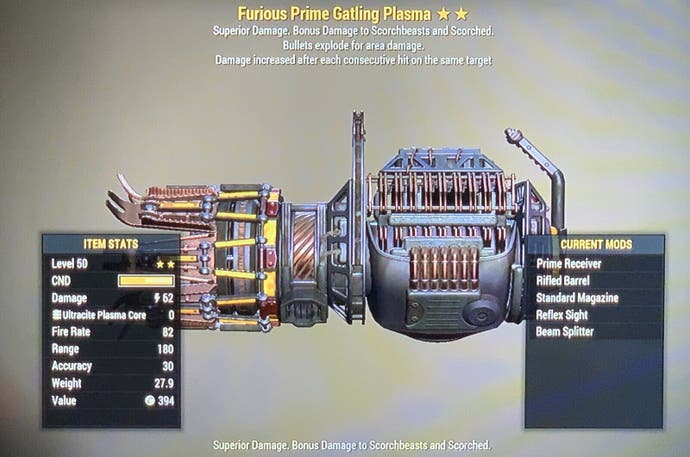
I eventually managed to get in contact with another eBay seller, who provided me with an up-to-date perspective on the current state of Fallout 76 gunrunning on the site. This one told me they'd been involved with duping and in-game trading from the very start, before the practice eventually moved to real-money trading (RMT).
"I have used duping and greatly profited from it - I won't deny it," they said, adding they were only aware of one publicly-known throwables duping method at present. "It's quiet now compared to [the] old days but you can still make some money. I have [a] few deliveries a day and I don't really play the game itself due to lack of new content. My endgame is effective cap generation methods and trading."
The seller was unable to tell me how much they'd made from selling on eBay, but it was interesting to learn that after a certain point, duping was no longer necessary to produce goods. Once you get rich in-game in terms of caps and assets, they explained, it's relatively easy to keep up with the demand for items.
I thought my journey into the world of eBay Fallout 76 trading would end there - but little did I know, I was about to encounter one of the biggest sellers on the platform. Curious about the expensive legacy weapons, I shot a message to the gatling gun listing's owner, who runs the store eBay store Fallout76Armoury. The seller, a college student who goes by the name Martin Tim (real name Haydar) in the Fallout community, boasts one of the biggest collections of Fallout 76 items on eBay - with over 140 items for PS4 currently listed for sale.
"I noticed a demand for items and a market I can invest my time in so I took advantage of it", Martin told me, explaining it had taken a long time to reach the major leagues in Fallout 76 item trading. "The process of me getting where I am now was not easy. I invested a lot of time trading my way up in ranks to access information and items I'm in need of... I've had to build relationships and a reputation with people who have knowledge of an upcoming duplication glitches and top tier items I can use to trade and build an inventory that I can sell."
For Martin, the first few months were time-consuming thanks to the need to build his reputation and promote his store - along with establishing a system to manage 12 different PlayStation accounts and document all his items on spreadsheets. Having built that trust, customers then started to approach him - and he now says there is "no overwhelming aspect" to the trading at all: merely meeting customers in-game to deliver items, and updating his spreadsheets to keep clients informed of new gear.
While Martin has noticed a gradual decrease in demand for items, he says it's still an extremely profitable industry - claiming he's sold weapons anywhere from £10-£500 each, making a total of $55k (£41.8k) in the 10 months since he started selling the items. "I consider myself the most successful 'individual' seller on the entirety of the platform and I say this as I have spoken to other competing sellers from all platforms," Martin added.
Although he couldn't provide records to back up that figure, I manually trawled through the publicly-viewable feedback on Martin's eBay page, and the sum of these alone is impressive. The most expensive item sold on this list is a custom bundle for £165, and roughly totalling up the items gets you slightly over £11k. This number, of course, doesn't include sales where best price was accepted (and therefore hidden) - nor does it give us Martin's total sales, as many customers fail to leave reviews. Martin also claims to sell on platforms other than eBay - with about 60 per cent of his deals made in private DMs to avoid website service fees. Privately, Martin also showed me sales records of the highest-priced items he'd sold on eBay, including a gun which shipped for £250. With these factors in mind, the publicly-verifiable figure does make Martin's claim seem plausible.
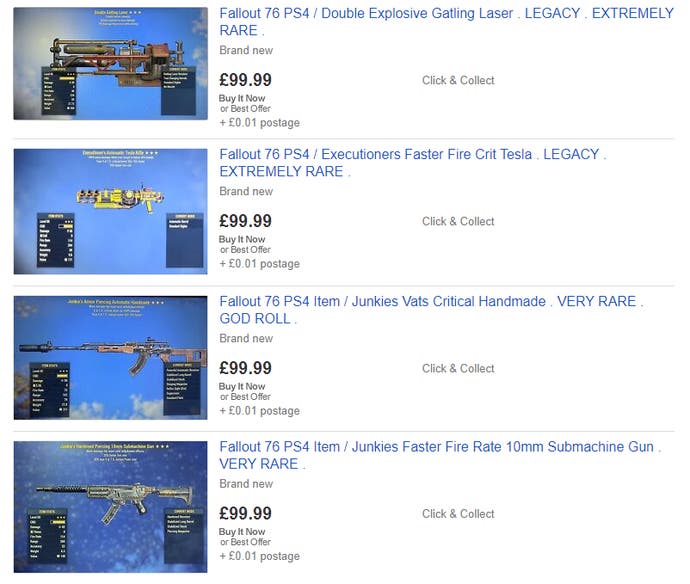
While real-money trading seems to be against Zenimax's terms of service - and selling duped items definitely is - when asked if Bethesda had tried to crack down on their trading, one seller argued there was a difference between duping and RMT.
"They have not and they should not - traders are providing a service that people are happy to pay for... RMT is a just a side effect for any 'serious' MMO. They should (and have) cracked down on duping in-game - I had two accounts banned for 100k Ultracite ammo but that is just the cost of doing business."
Martin, meanwhile, said he's never been banned. He estimates 80 per cent of his stock is duped (something he says is due to a spate of mass duping crazes previously flooding the market - claiming he's only been involved in later "more controlled duping"), and he's managed to avoid hitting the weight cap by spreading his inventory over 12 PSN accounts and 70 different Fallout 76 characters.
"Bethesda has never interfered with any real life currency trading ... simply because they couldn't care less," he added. "Bethesda is a multi-million company who I assume does not consider from my perspective sellers who are selling items and somewhat promoting their game."
Of course, the Fallout 76 sellers were probably never going to argue against their own interests - but they did make a fair point about RMT. Given the, um, buzz around Fallout 76 has now calmed down, it wouldn't make sense for Bethesda or Zenimax to really crack down - and from the sounds of it, the most public duping methods have been patched out, and the demand for items is slowly decreasing. So long as people aren't using mass duping methods to produce the weapons - which upsets the game balance and has been blamed for destabilising servers - it at least seems relatively harmless (if obviously pay to win).
Eurogamer contacted Bethesda and eBay to ask about the sale of Fallout 76 in-game items for real money, but both failed to comment by time of publication.
Given the amounts these sellers made from selling weapons, it does make you wonder how much Bethesda could have made if it had straight-up sold weapons in the Atomic Shop - a slightly scary thought. But above all else, this experimentation with duping methods and glitches to produce grey-market product - delivered via in-game meet-ups, arranged on Discord - feels very Fallout. "Gun Runner" is even the name of a perk in Fallout 76 - while in New Vegas, the Gun Runners are weapons merchants who supply both the NCR and the Courier. One source told me he estimates 60 per cent of Fallout 76's wealth is held by less than one per cent of the player base: a small group of glitchers, dupers and traders who all know each other and share secrets. And aside from being strangely similar to our own world, that in-game wealth can clearly be converted into real-world bank through gunrunning. Now that's post-nuclear entrepreneurial spirit to make Mr. House proud.
